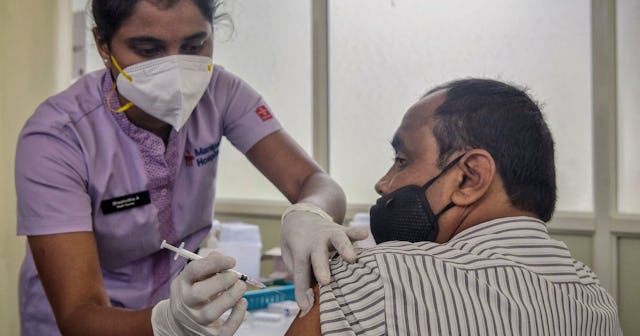Study Shows Pfizer & Moderna Vaccine Immunity Could Last Years

New evidence shows that people who received mRNA vaccines may not need booster shots to protect against COVID-19
The two vaccines that have been most widely used in the U.S. rollout, made by Pfizer and Moderna, are mRNA vaccines, a new kind of technology that was tested against COVID and turned out to be effective. In fact, we rarely take stock of just how lucky we are that these vaccines did turn out to be so effective. They provide over 90 percent protection against the coronavirus, and new research indicates that that protection could last for years. In fact, scientists are now wondering if people who received mRNA shots will even need boosters.
“It’s a good sign for how durable our immunity is from this vaccine,” said Ali Ellebedy, an immunologist at Washington University in St. Louis who led the study, which was published in the journal Nature on Monday.
The new study shows that, while we still don’t know how long protection from mRNA vaccines will last, it’s likely to be a long time, provided the virus doesn’t mutate much beyond its current forms. People who recovered from COVID infections and then received an mRNA vaccine were shown to have an even more powerful immune response, one that scientists say could last for life, even if the virus does mutate.
To test immune responses after vaccination, scientists took samples from the lymph nodes of study participants three, four, five, seven and 15 weeks after their first vaccine dose. They found that even at the 15-week mark, the participants’ immune systems were still active at learning how to fight COVID. Normally, after vaccinations, the immune response peaks at around two weeks, and by four to six weeks later, there’s little activity remaining.
“The fact that the reactions continued for almost four months after vaccination — that’s a very, very good sign,” Ellebedy told the New York Times.
Marion Pepper, an immunologist at the University of Washington in Seattle, tells the New York Times of the variants: “Everyone always focuses on the virus evolving — this is showing that the B cells are doing the same thing. And it’s going to be protective against ongoing evolution of the virus, which is really encouraging.”
This means that protection against existing variants of the coronavirus is likely to last. But there’s no telling how that might change as new variants of the virus emerge — and they are almost certain to evolve as infections continue to rage around the world. The scientists who worked on this study also didn’t compare the immune responses of those who received a Johnson&Johnson vaccine, but said that their protection is likely to be more limited than what comes from mRNA vaccines.